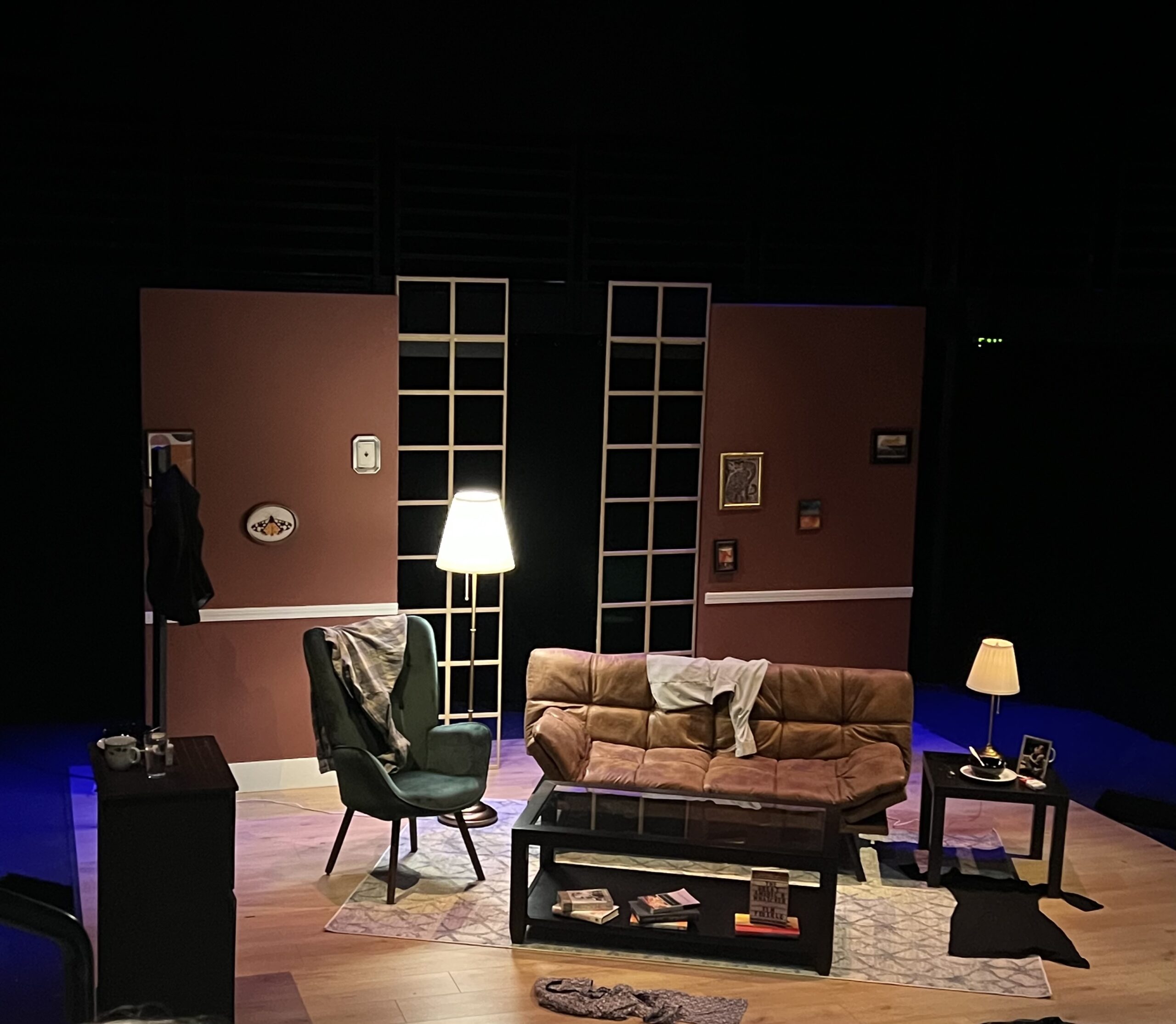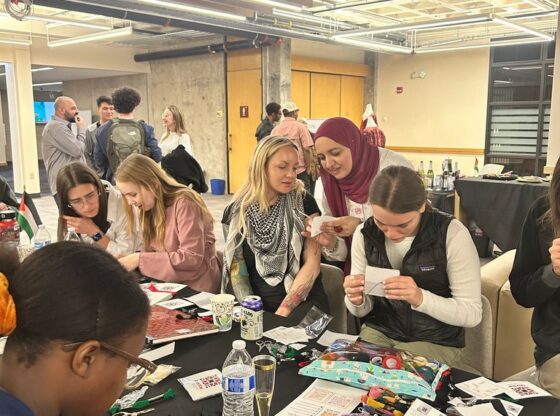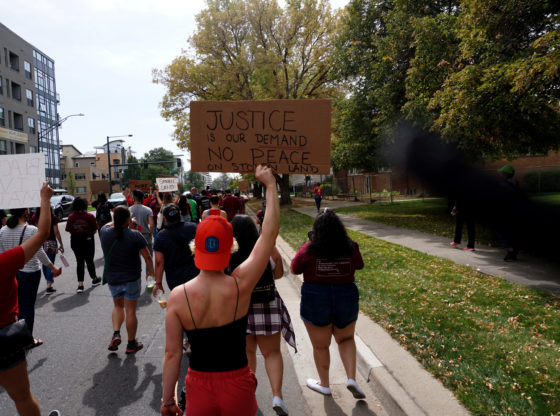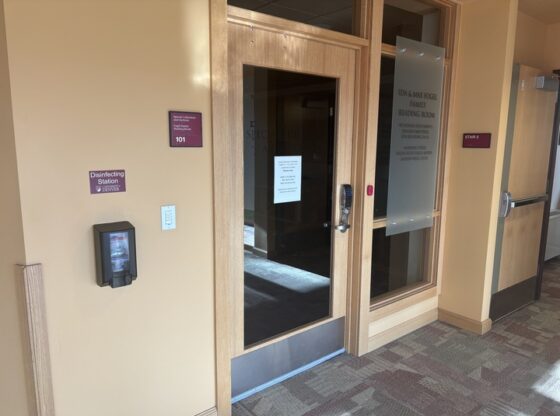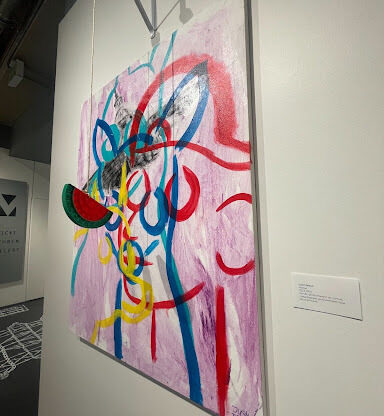Content Warning: This article discusses themes of domestic violence, hate crimes and LGBTQ+ struggles as portrayed in the senior short play festival. Reader discretion is advised.
Many students dream of having something to look back on and be proud of when wrapping up their final year of college. Jayce Rumsey, Kanara Bramlett-Pittman and Ryan Thomas are three DU seniors who got this experience on the opening night of the 2024 Senior Short Play Festival.
Theater department students are required to direct a capstone play in their final year, which consists of picking the show, hosting auditions, forming a creative team and directing rehearsals. This is no simple process according to Rumsey. Students are expected to rehearse for three weeks, followed by one tech day (a runthrough with lighting, scenery and sound), two dress rehearsals and a final production weekend.
I got a chance to sit back and enjoy the show, before speaking with Rumsey about the creative process and what it felt to see his magic happen in front of a live audience.
But first, let’s talk about the plays.
“The Wasp,” written by Morgan Lloyd Malcom and directed by Bramlett-Pittman, started off as a funny interaction between two former high school enemies, whose worlds reconnected when Heather (Megan Fournier), invited Carla (Sofie Henry) over to ask the question – will you kill my husband? After some fertility issues, Heather had caught on to her husband sneaking around with another woman, complaining about her inability to bear a child. Carla agreed to kill him for $30,000, hoping to turn her life around for her and her kids.
One thing led to another, and Heather ended up drugging and tying up Carla, as payback for some awful things Carla had done to her in high school. You may have seen this coming, but Carla happened to be the woman that Heather’s already-dead husband was sneaking around with. The entire show takes place inside and outside of Heather’s place, where finally, Carla is untied and able to stab Heather to her death as she ends the scene saying “good girl,” to Carla, the exact words used on her in an explicit bathroom scene at their high school dance.
This two (wo)man show was impressive both on stage and off. The set presented itself as a normal, suburbia home where nothing could go wrong. Well, if you’ve seen your share of horror movies, you may already know that this is rarely the case.
The artistic team for “The Wasp,” consisted of Olive Askew (scenic designer), Sophie Van Winkle (lighting designer), Jane Rusk (costume designer), Kate Herbert (sound designer) and Luke Sewpersaud (stage manager).
The second show was titled “Paper Thin,” written by Lindsay Price and directed by Thomas. It was technically a four-person cast, consisting of characters Sweetie (Jake Henry), Punkin (Alex MacNeill), and a man and a woman whose faces we never see, voiced by Garrett Sullivan and Rhianna Lewis.
The scene starts in a very lively way, with Sweetie welcoming Punkin home to a charcuterie board and champagne. This show does a good job of keeping the audience in the dark for a while, while we try to piece together what is really going on. In the fast-paced tone of the piece, Punkin replaces two frames on the wall with a whiteboard that appears to be some sort of point system: a column titled “him” and a column titled “her.”
The couple behind the wall “gets home” and immediately starts arguing with each other, while Punkin and Sweetie excitedly take turns marking points on the board. It appeared that any time the man behind the wall yelled at the woman, she got a point. By this point in the show, it was obvious that this game was a common occurrence. The screaming begins to acclimate and just as Punkin is egging the man on, it gets out of hand and the couple is stopped in their tracks as they hear three loud hits, implying that he had beaten her.
After a moment of silence, the scene turns into an argument of their own, with Punkin wanting to call the police and Sweetie demanding that they wait a week. The fight continues and the scene reaches its climax, where Punkin slaps Sweetie and he knocks the cell phone out of her hand. As they are scrambling on the ground for the phone, they hear the man on the other side of the wall: “I’m so sorry. I love you. This will never happen again.”
The end of the scene left the audience to interpret what happens next, while trying to piece together the social commentary that is demonstrated in this production.
The artistic team behind “Paper Thin” consisted of Kasper Kupsc (scenic designer), Marleigh Hickey (lighting designer), Nox Ervin (costume designer), Kate Herbet (sound designer) and Ruby Gregerson (stage manager).
After a 15-minute intermission, the final show began, titled “The Door.” This short was written by Paul Elliot and directed by Rumsey.
In this show, it took a little longer to figure out exactly what was happening, which I believe was the point.
The scene starts out in the dark, with Grace (Faith Stafford) lying on the couch in what appears to be her messy apartment, refusing to open the door to the almost constant knocking that was happening outside.
Grace is approached by her grandson, Justin (James Howell), who keeps encouraging her to “open the door.”
Their relationship is interesting and it takes the audience a while to understand what is fully happening. It appears that Grace has shut herself off from everyone other than her grandson, who tries to trick her into turning on some lights and opening the door, which appears to mean something much more than what we understand at this time. It isn’t until he says that she would have never let him hide away like this, that we finally start to understand what might have happened.
Eventually, Grace gives in and opens the door, as Justin exits the scene. We hear the words “Are you the mother of Justin?” She responds in between sobs, “no, I’m his grandmother, what happened to my Justin?” Everything in that moment clicked. The scene breaks into a monologue where Grace explains that her grandson was beaten to death by people who thought he might be gay. She then goes on to demand justice for not only her son, but the hundreds of other LGBTQ+ community members who have been killed for being themselves.
A projector behind Grace drops, showing photos of real innocent lives taken because of their identities. I could feel a shift in the audience’s demeanor. This emotional show brought many tears but more importantly, reflection.
Being a part of the LGBTQ+ community, Rumsey knew he wanted to do something that involved queer history.
“I struggled a lot in high school with my own personal coming out story,” Rumsey said.
“When I stumbled upon this show, and it was about a relationship with a grandma and her grandson, there were a lot of parallels in my life that I really loved,” he said.
Rumsey also wanted to highlight the queer hate victims, and although he stuck to the script written by Elliot, he chose to update the projected slides at the end, to include recent victims such as Nex Benedict.
“We’ve been working on this for about four months,” Rumsey said. “It’s a very collaborative process. I really did rely on my team to bring my vision to life.”
The team consisted of Rhianna Lewis (scenic designer), Riley Cohen (lighting designer), Lauryn Zepeda (costume designer), Aspen McCart (sound designer) and Megan Williams (stage manager).
“There was a sense of euphoria. I felt extremely proud of what we have accomplished, and I couldn’t be more thankful,” Rumsey said.
Overall, I was very impressed by every student involved in these productions, both on stage and off. My only critique – where is the content warning? These plays shed light on devastating and all-too-real issues such as hate crimes and domestic violence. While it’s important to bring these meaningful conversations into the theatrical space, it’s equally as important to handle these topics with care.
The three-part show carried on throughout the weekend, with two more night shows and a Sunday matinee. Students can enjoy another show at Lamont from May 23-27 called “Constellations” written by Nick Payne and directed by Allison Watrous.

